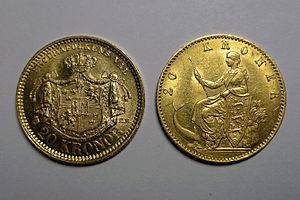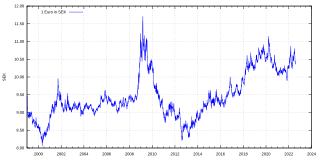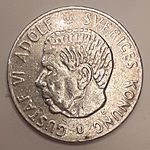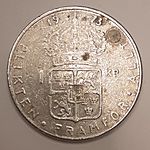Swedish krona facts for kids

The Swedish krona is the currency of Sweden. The country of Sweden has used this money since 1873. In the English language, the Swedish krona means the Swedish Crown.
One krona is subdivided into 100 öre (singular; plural öre or ören, where the former is always used after a cardinal number, hence "50 öre", but otherwise the latter is often preferred in contemporary speech). However, all öre coins were discontinued from 30 September 2010. Goods can still be priced in öre, but all sums are rounded to the nearest krona when paying with cash. The word öre is ultimately derived from the Latin word for gold (aurum).
The Swedish crowns consist of:
- 1 öre (coin) *1991
- 2 öre (coin) *1991
- 5 öre (coins) *1991
- 10 öre (coins) *1991
- 25 öre (coin) *1991
- 50 öre (coin)
- 1 crown (coin)
- 5 crown (coin)
- 10 crown (coin) * (**)
- 10 crown (coin)
- 20 crown (paper)
- 50 crown (paper)
- 100 crown (paper)
- 500 crown (paper)
- 1000 crown (paper)
This is all the Swedish money there is.
*Not in use since:
**Not known when ended.
History
The introduction of the krona, which replaced at par the riksdaler, was a result of the Scandinavian Monetary Union, which came into effect in 1876 and lasted until the beginning of World War I. The parties to the union were the Scandinavian countries, where the name was krona in Sweden and krone in Denmark and Norway, which in English literally means "crown". The three currencies were on the gold standard, with the krona/krone defined as 1⁄2480 of a kilogram of pure gold.
The mutual equivalence of all three currencies ended in World War I when their convertibility to gold was suspended. While their gold parities remained during most of the interwar period, these currencies have generally been quoted at varying market rates.
Current Changes
On December 18 2008, the Swedish Riksbank asked to phase out the 50 öre, the final öre coin, by 2010. Note, however that the öre would remain as a subdivision unit for electronic payments.
On 11 September 2012, the Riksbank announced a new series of coins with new sizes to replace the 1 and 5 krona coins which arrived in October 2016. The design of the coins follows the theme of singer-songwriter Ted Gärdestad's song, "Sol, vind och vatten" (English: "Sun, wind and water"), with the designs depicting the elements on the reverse side of the coins. This also included the reintroduction of the 2 krona coin, while the current 10 krona coin remained the same. The new coins also have a new portrait of the king in their design. One of the reasons for a new series of coins is to end the use of nickel (for allergy reasons). Vending machines and parking meters have to a fairly high degree stopped accepting coins and accept only bank cards or mobile phone payments. Cash is already less used in Sweden, with many avoiding cash as much as possible.
Exchange rate

To see where Swedish krona ranks in "most traded currencies", read the article on the Foreign exchange market.
The exchange rate of the Swedish krona against other currencies has historically been dependent on the monetary policy pursued by Sweden at the time. Since the Swedish banking rescue, a managed float regimen has been upheld.
The weakest the krona has been relative to the euro was 6 March 2009 when one euro bought 11.6465 SEK. The strongest the krona has been relative to the euro was on 13 August 2012 when one euro bought 8.2065 SEK. The weakness in the euro was due to the crisis in Greece which began in July 2012 and fear of further spreading to Italy and Spain. The average exchange rate since the beginning of 2002 when the euro banknote and coins were issued and 1 March 2017 was 9.2884 SEK/EUR.
Future
The Riksbank decided in 17 February 2010, to recommend the parliament to allow it to issue a 2-krona coin and a 200-krona note, the latter a new denomination for the country. However it did not recommend replacing the 20-krona note with a coin.
Relationship to the euro
According to the 1994 accession treaty (effective 1 January 1995), Sweden is required to join the eurozone and therefore must convert to the euro once the convergence criteria are met. Notwithstanding this, on 14 September 2003, a consultative Swedish referendum was held on the euro, in which 56% of voters were opposed to the adoption of the currency, out of an overall turnout of 82.6%. The Swedish government has argued such a course of action is possible since one of the requirements for eurozone membership is a prior two-year membership of the ERM II. By simply not joining the exchange rate mechanism, the Swedish government is provided a formal loophole avoiding the theoretical requirement of adopting the euro.
Some of Sweden's major parties continue to believe it would be in the national interest to join, but all parties have pledged to abide by the results of the referendum, and none have shown any interest in raising the issue again. There was an agreement among the parties not to discuss the issue before the 2010 general election. In a poll from May 2007, 33.3% were in favour, while 53.8% were against and 13.0% were uncertain.
In February 2009, Fredrik Reinfeldt, the Prime Minister of Sweden, stated that a new referendum on the euro issue will not be held until support is gained from the people and all the major parties. Therefore, the timing is now at the discretion of the Social Democrats. He added, the request of Mona Sahlin, former leader of the Social Democratic Party, for deferral of a new referendum until after the 2010 mandate period should be respected.
As of 2014[update], support for Swedish membership of the euro among the general population is low. In September 2013, support fell as low as 9%. The only party in the Riksdag that supports Swedish entry in the euro (as of 2015) is the centrist Liberal Party.
The e-krona
The e-krona (electronic krona) is a proposed electronic currency to be issued directly by the Riksbank. It is different from the electronic transfers using commercial bank money as central bank money has no nominal credit risk, as it stands for a claim on the central bank, which cannot go bankrupt, at least not for debts in Swedish krona.
The declining use of cash in Sweden is going to be reinforced cyclically. As more businesses find that they can function without accepting cash, the number of businesses refusing to accept cash will increase. That will re-enforce the need for more and more citizens to get the Swish app which is already used by half the population. Cash machines, which are controlled by a Swedish bank consortium, are being dismantled by the hundreds, especially in rural areas.
The Riksbank has not taken a decision on issuing e-krona. First, the Riksbank needs to investigate a number of technical, legal and practical issues. "The declining use of cash in Sweden means that this is more of a burning issue for us than for most other central banks. Although it may appear simple at first glance to issue e-krona, this is something entirely new for a central bank and there is no precedent to follow". If the Riksbank chooses to issue e-krona, it is not to replace cash, but to act as a complement to it. "The Riksbank will continue issuing banknotes and coins as long as there is demand for them in society. It is our statutory duty and we will of course continue to live up to it," concluded Deputy Governor Cecilia Skingsley.
In December 2020, Sweden's Minister for Financial Markets Per Bolund announced a government review to explore the feasibility of moving to a digital currency that is expected to be completed by the end of November in 2022. Anna Kinberg Batra, a former chairwoman of the Riksbank's finance committee, was announced as the leader of the review.
See also
 In Spanish: Corona sueca para niños
In Spanish: Corona sueca para niños



